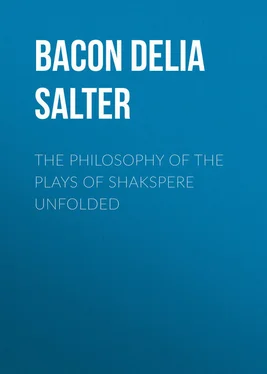Delia Bacon - The Philosophy of the Plays of Shakspere Unfolded
Здесь есть возможность читать онлайн «Delia Bacon - The Philosophy of the Plays of Shakspere Unfolded» — ознакомительный отрывок электронной книги совершенно бесплатно, а после прочтения отрывка купить полную версию. В некоторых случаях можно слушать аудио, скачать через торрент в формате fb2 и присутствует краткое содержание. Жанр: literature_19, foreign_antique, foreign_prose, на английском языке. Описание произведения, (предисловие) а так же отзывы посетителей доступны на портале библиотеки ЛибКат.
- Название:The Philosophy of the Plays of Shakspere Unfolded
- Автор:
- Жанр:
- Год:неизвестен
- ISBN:нет данных
- Рейтинг книги:3 / 5. Голосов: 1
-
Избранное:Добавить в избранное
- Отзывы:
-
Ваша оценка:
- 60
- 1
- 2
- 3
- 4
- 5
The Philosophy of the Plays of Shakspere Unfolded: краткое содержание, описание и аннотация
Предлагаем к чтению аннотацию, описание, краткое содержание или предисловие (зависит от того, что написал сам автор книги «The Philosophy of the Plays of Shakspere Unfolded»). Если вы не нашли необходимую информацию о книге — напишите в комментариях, мы постараемся отыскать её.
The Philosophy of the Plays of Shakspere Unfolded — читать онлайн ознакомительный отрывок
Ниже представлен текст книги, разбитый по страницам. Система сохранения места последней прочитанной страницы, позволяет с удобством читать онлайн бесплатно книгу «The Philosophy of the Plays of Shakspere Unfolded», без необходимости каждый раз заново искать на чём Вы остановились. Поставьте закладку, и сможете в любой момент перейти на страницу, на которой закончили чтение.
Интервал:
Закладка:
'So our virtues
Lie in the interpretation of the times,'
'says the unfortunate Tullus Aufidius, in the act of conducting a Volscian army against the infant Roman state, bemoaning himself upon the conditions of his historic whereabouts, and beseeching the sympathy and favourable constructions of posterity —
So our virtues
Lie in the interpretation of the times;
And power unto itself most commendable
Hath not a tomb so evident as a hair
To extol what it hath done.
'The times,' says Lord Bacon, speaking in reference to books particularly, though he also recommends the same key for the reading of lives, 'the times in many cases give great light to true interpretations.'
'Now as much as decency permits,' continues the other, anticipating here that speech which he might be supposed to have been anxious to make in defence of his posthumous reputation, could he have spoken when he was dying, and forestalling that criticism which he foresaw – that odious criticism of posterity on the discrepancy between his life and his judgment – 'Now as much as decency permits, I here discover my inclinations and affections. If any observe , he will find that I have either told or designed to tell ALL. What I cannot express I point out with my finger .
'There was never greater circumspection and military prudence than sometimes is seen among US; can it be that men are afraid to lose themselves by the way, that they reserve themselves to the end of the game ?'
'There needs no more but to see a man promoted to dignity, though we knew him but three days before a man of no mark, yet an image of grandeur and ability insensibly steals into our opinion, and we persuade ourselves that growing in reputation and attendants, he is also increased in merit': —
Hamlet . Do the boys carry it away?
Ros . Ay, that they do, my lord. Hercules and his load too.
Hamlet . It is not very strange; for my uncle is king of Denmark, and those that would make mouths at him while my father lived, give twenty, forty, fifty, a hundred ducats a-piece for his picture in little. 'Sblood, there is something in this, more than natural [talking of the _super_natural], if philosophy could find it out .
'But,' our prose philosopher, whose mind is running much on the same subjects, continues 'if it happens so that he [this favourite of fortune] falls again, and is mixed with the common crowd, every one inquires with wonder into the cause of his having been hoisted so high. Is it he ? say they: did he know no more than this when he was in PLACE?' ['change places … robes and furred gowns hide all.'] Do princes satisfy themselves with so little? Truly we were in good hands ! That which I myself adore in kings, is [note it] the crowd of the adorers . All reverence and submission is due to them, except that of the understanding ; my reason is not to bow and bend, 'tis my knees ' 'I will not do't' says another, who is in this one's counsels,
I will not do't
Lest I surcease to honour mine own truth,
And by my body's action, teach my mind
A most inherent baseness.
'Antisthenes one day entreated the Athenians to give orders that their asses might be employed in tilling the ground , – to which it was answered, "that those animals were not destined to such a service ." "That's all one," replied he; "it only sticks at your command; for the most ignorant and incapable men you employ in your commands of war , immediately become worthy enough because – YOU EMPLOY THEM."'
There mightst thou behold the great image of authority. A dog's obeyed in office. – Lear.
For thou dost know, oh Damon dear,
This realm dismantled was
Of Jove himself; and now reigns here,
A very – very — Peacock .
Horatio. You might have rhymed. Hamlet.
'to which,' continues this political philosopher, – that is, to which preceding anecdote – containing such unflattering intimations with regard to the obstinacy of nature, in the limits she has set to the practical abilities of those animals , not enlarging their natural gifts out of respect to the Athenian selection (an anecdote which supplies a rhyme to Hamlet's verse, and to many others from the same source) – ' to which the custom of so many people , who canonize the KINGS they have chosen out of their own body , and are not content only to honour, but adore them, comes very near. Those of Mexico [for instance, it would not of course do to take any nearer home], after the ceremonies of their king's coronation are finished, dare no more look him in the face ; but, as if they deified him by his royalty, among the oaths they make him take to maintain their religion and laws , to be valiant, just and mild; he moreover swears, — to make the sun run his course in his wonted light, – to drain the clouds at a fit season, – to confine rivers within their channels, – and to cause all things necessary for his people to be borne by the earth .' '(They told me I was everything. But when the rain came to wet me once, when the wind would not peace at my bidding,' says Lear, 'there I found them, there I smelt them out.)' This, in connection with the preceding anecdote, to which, in the opinion of this author, it comes properly so very near, may be classed of itself among the suggestive stories above referred to; but the bearing of these quotations upon the particular question of style, which must determine the selection here, is set forth in that which follows.
It should be stated, however, that in a preceding paragraph, the author has just very pointedly expressed it as his opinion, that men who are supposed, by common consent, to be so far above the rest of mankind in their single virtue and judgment, that they are permitted to govern them at their discretion, should by no means undertake to maintain that view, by exhibiting that supposed kingly and divine faculty in the way of speech or argument ; thus putting themselves on a level with their subjects, and by meeting them on their own ground, with their own weapons, giving occasion for comparisons, perhaps not altogether favourable to that theory of a superlative and divine difference which the doctrine of a divine right to rule naturally presupposes. 'For,' he says, 'neither is it enough for those who govern and command us, and have all the world in their hand , to have a common understanding, and to be able to do what the rest can' [their faculty of judgment must match their position, for if it be only a common one, the difference will make it despised]: 'they are very much below us, if they be not infinitely above us . And, therefore, silence is to them not only a countenance of respect and gravity, but very often of good profit and policy too; for, Megabysus going to see Apelles in his painting room, stood a great while without speaking a word, and at last began to talk of his paintings, for which he received this rude reproof. ' Whilst thou wast silent , thou seemedst to be something great, by reason of thy chains and pomp; but now that we have heard thee speak , there is not the meanest boy in my shop that does not despise thee.' But after the author's subsequent reference to 'those animals' that were to be made competent by a vote of the Athenian people for the work of their superiors, to which he adds the custom of people who canonize the kings they have chosen out of their own body, which comes so near, he goes on thus: — I differ from this common fashion , and am more apt to suspect capacity when I see it accompanied with grandeur of fortune and public applause . We are to consider of what advantage it is, to speak when one pleases, to choose the subject one will speak of – [an advantage not common with authors then] – TO INTERRUPT OR CHANGE OTHER MEN'S ARGUMENTS, WITH A MAGISTERIAL AUTHORITY, to protect oneself from the opposition of others, by a nod, a smile, or silence, in the presence of an assembly that trembles with reverence and respect. A man of a prodigious fortune , coming to give his judgment upon some slight dispute that was foolishly set on foot at his table , began in these words: – 'It can only be a liar or a fool that will say otherwise than so and so.' ' Pursue this philosophical point with a dagger in your hand .'
Читать дальшеИнтервал:
Закладка:
Похожие книги на «The Philosophy of the Plays of Shakspere Unfolded»
Представляем Вашему вниманию похожие книги на «The Philosophy of the Plays of Shakspere Unfolded» списком для выбора. Мы отобрали схожую по названию и смыслу литературу в надежде предоставить читателям больше вариантов отыскать новые, интересные, ещё непрочитанные произведения.
Обсуждение, отзывы о книге «The Philosophy of the Plays of Shakspere Unfolded» и просто собственные мнения читателей. Оставьте ваши комментарии, напишите, что Вы думаете о произведении, его смысле или главных героях. Укажите что конкретно понравилось, а что нет, и почему Вы так считаете.












